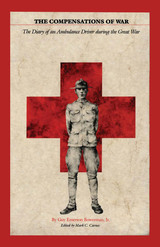
In 1917, shortly after the United States’ declaration of war on Germany, Guy Emerson Bowerman, Jr., enlisted in the American army’s ambulance service. Like other young ambulance drivers—Hemingway, Dos Passos, Cummings, Cowley—Bowerman longed to “see the show.” He was glad to learn that the ambulance units were leaving for France right away.
For seventeen months, until the armistice of November 1918, Bowerman kept an almost daily diary of the war. To read his words today is to live the war with an immediacy and vividness of detail that is astonishing.
Only twenty when he enlisted, Bowerman was an idealistic, if snobbish, young man who exulted that his section was made up mostly of young “Yalies” like himself. But he expected the war to change him, and it did. In the end he writes that he and his compatriots scarcely remember a world at peace. "The old life was gone forever. . ."
Guy Bowerman’s unit was attached to a French infantry division stationed near Verdun. Sent to halt the German drive to Paris in 1918, the division participated in the decisive counterattack of July and tracked the routed Germans through Belgium. Then, “unwarned,” Bowerman and his comrades were “plunged into … a life of peace.” Into this life, he writes, they walked “bewildered,” like “men fearing ambush.”
This remarkable chronicle of one young man’s rite of passage is destined to become a classic in the literature of the Great War.

As World War I dragged on into 1915, German armies along the Western Front settled into stalemate with entrenched British and French forces. But in the East the picture was quite different. The Kaiser’s army routed the Russians, took possession of Polish territory, and attempted to create a Polish satellite state. Elusive Alliance delves into Germany’s three-year occupation of Poland and explains why its ambitious attempt at nation-building failed.
Dubbed the Imperial Government-General of Warsaw, Germany’s occupation regime was headed by veteran Prussian commander Hans Hartwig von Beseler. In his vision for Central Europe, Poland would become Germany’s permanent ally, culturally and politically autonomous but bound to the Fatherland in foreign policy matters. To win Polish support, Beseler spearheaded the creation of new institutions including a Polish-language university in Warsaw, reformed the school system, and established democratically elected municipal governments. For Beseler and other German strategists, a secure Poland was essential to ensuring Central Europe against a threatening tide of nationalism and revolution.
But as Jesse Kauffman shows, Beseler underestimated the resistance to his policies and the growing hostility to occupation as Germany plundered Polish resources to fuel its war effort. By 1918, with the war over, Poles achieved independence. Yet it would not be long before they faced a second, far more brutal German occupation at the hands of the Nazis.

READERS
Browse our collection.
PUBLISHERS
See BiblioVault's publisher services.
STUDENT SERVICES
Files for college accessibility offices.
UChicago Accessibility Resources
home | accessibility | search | about | contact us
BiblioVault ® 2001 - 2024
The University of Chicago Press









